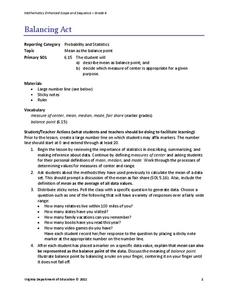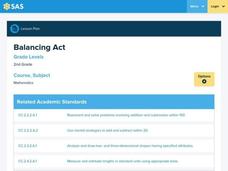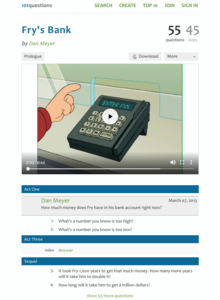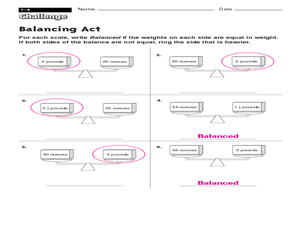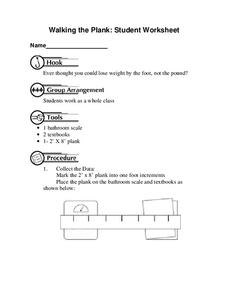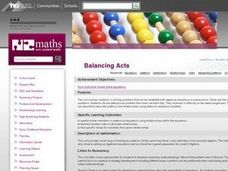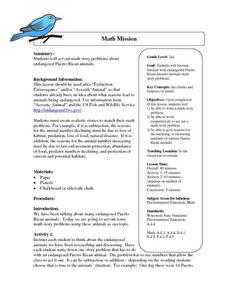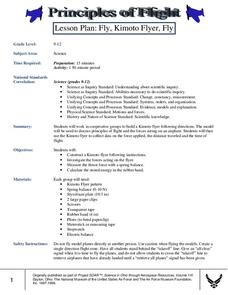EngageNY
The Mean as a Balance Point
It's a balancing act! Pupils balance pennies on a ruler to create a physical representation of a dot plot. The scholars then find the distances of the data points from the balance point, the mean.
Virginia Department of Education
Balancing Act
How many different interpretations of the mean are there? Scholars place numbers on a number line and determine the mean. They interpret the mean as the average value and as the balance point.
National Security Agency
A Balancing Act: Solving Multi-Step Equations
Wow! Put on that thinking cap and solve multi-step equations. To solve equations, learners review the use of the distributive property and combining like terms. This three-day lesson comes with about 20 pages of worksheets, warm-ups,...
Missouri Department of Elementary
Are You Balanced?
Balance scales create a strong visual of how an individual prioritizes one's self alongside their commitments to the community, school, and home. Scholars complete a graphic organizer then discuss their findings with their peers. A...
Curated OER
Balancing Act
Second graders identify the attributes of various shapes and estimate the weight of the objects. In this geometry lesson, 2nd graders identify the attributes of concrete objects and use a pan balance to weight them.
Curated OER
Balancing Act
In this balancing a scale worksheet, 2nd graders draw pictures to show how they can balance the scale using all four weights in five different scenarios.
Curated OER
The Balancing Act: Bottles, Plates, Drinking Glasses and Jugs
In this algebra worksheet, students ponder this 1 puzzle concerning the balance of bottles, plates, drinking glasses, and jugs. Students set up equations from a word problem and proceed in determining how much of one is needed to balance...
Curated OER
Place Value Balancing Act
In this place value balancing act worksheet, 1st graders cut out the unit weights (100, 10, 1) and put them on four scales to make them balance with the weights given.
Curated OER
Balancing Act
In this equations activity, learners solve one digit addition and subtraction problems and then put 2 problems on each scale that are related. Students complete 12 equations and put 8 scales together.
Curated OER
Are You Balanced?
Fifth graders discuss what it means to have balance in their lives. Individually, they are given a worksheet in which they list their activities and things they are involved in. To end the lesson, they place weights on each side of a...
Curated OER
The Shapes Balancing Act
Students comprehend the concept of balance, specifically the terms "base of support" and "center of gravity". They review the different basic shapes: triangle, circle, square, line, point, and rectangle. Students discuss how we use...
101 Questions
Fry's Bank
If money was left in an interest-earning account for 1,000 years, how much would it increase? Viewers watch a clip from a show about the future when someone learns about their balance after 1,000 years. Then, they solve for the amount in...
Curated OER
Fruity Math
Students solve one step linear equations. In this algebra lesson, students manipulate their variables and numbers to answer each problem. They make sure the equations stay balanced at all times.
Curated OER
Transforming Food Energy: A Balancing Act
Students explain their role as consumers. They use a purchased calorimeter or make their own simple calorimeter to measure the energy content in selected foods. This interesting lesson really gets students thinking about what they eat.
Curated OER
Calder's Balancing Acts
Students learn the vocabulary of contemporary sculpture and distinguish between abstract and realistic sculpture, mobile and stabile, biomorphic and geometric. They write equations using Calder's mobiles
Curated OER
Using a Balance to Compare Weights
For this using a balance to compare weights worksheet, 3rd graders compare two weights in pounds and ounces, write "balanced" if they are equal or circle the one that is heavier if they are not equal.
Curated OER
Walking the Plank
This is a cool math activity. Kids collect and interpret data based on a physical act. A board is balanced between a scale and a step, learners record a peer's weight as it decreases while s/he walks further away from the scale. They...
Curated OER
Balancing Acts
Fourth graders solve problems that can be modeled with algebraic equations or expressions. There are five sets of problems. Students should attempt one problem from each set each day. They increase in difficulty as the week progresses....
Curated OER
Thiebaud Cake Math: Elementary
Students explore the American artist Wayne Thiebaud. They practice addition, subtraction, fractions, money problems, and classification problems by carefully examining his painting entitled Cakes. They create a bold cake painting.
Curated OER
Lobster Roll!
High schoolers collect data by playing a game that illustrates the delicate ecological balance between fishing, fishing regulations and fish populations. They graph and analyze the data and explain how economic decisions can affect the...
Curated OER
Counting on Art
Explore the life and painting style of African-American artist Horace Pippin by looking carefully at its parts, then create a "secret number" painting for a classroom counting book.
Curated OER
Math Mission
Second graders investigate the concept of Puerto Rican animals through using math word problems. They create a story to correlate with the word problems. The lesson also uses data of species counts to show increases and decreases for...
Curated OER
Thiebaud Cake Math: Intermediate
Students explore the life and art of American artist Wayne Thiebaud. They learn and practice math concepts by carefully examining the painting Cakes. They create a bold cake painting, either online or with classroom art materials.
Curated OER
Principles of Flight
Young scholars explore the principles of flight. For this flight lesson, students construct a model plane and investigate the forces acting on the flier. They will measure the thrust and calculate the stored energy.



